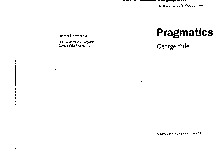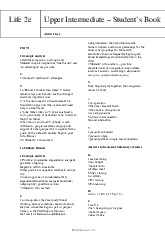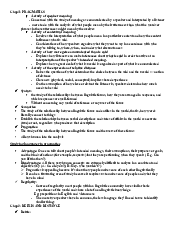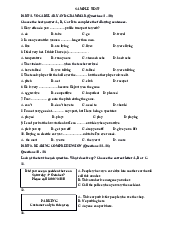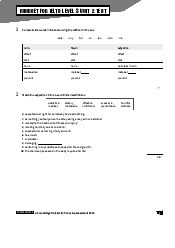





Preview text:
•
Politeness in common sense: showing good manners and consideration for other people. •
Linguistic politeness: the use of language to carry out social actions where mutual face wants are respected. EXAMPLE OF POLITENESS - A student to teacher
Student : Excuse me Mrs Kim Anh, but can I talk to you for a minute? - Friend to friend Hey Kim, got a minute?
KINDS OF FACE SAVING ACT
Negative face is the need to be independent to have a freedom of action and not to be imposed by others.
Example: Your friend asks to borrow your money
Negative face needs: You think, this is not favorable, maybe she won't return the
money, you don't feel reliant enough to give money for her. You have other stuff that I
could be doing with my money like shopping, have new hair,etc. she can get money from her family.
Positive face is the need to be accepted, even liked by others, to be treated as a member
of the group and to know that his or her wants are shared by others. Positive face needs:
You think, It's better to lend her money because you want him to
like you, and you want to be known as kind and friendly
In conclusion, we can say that negative face is the need to be independent and positive
face is the need to be connected. Positive politeness Negative politeness •
Positive politeness orients to •
Negative politeness orients to
preserving the positive face of
preserving the negative face of other other people. people. • When we use positive •
This is much more likely if there is a politeness, we use speech
social distance between the speaker
strategies(cluoc) that emphasize and the hearer.
our solidarity(sự đoàn kết) or •
When we use negative politeness, we friendliness with the hearer.
use speech strategies that emphasizes
our deference or respect(sự tôn trọng) for the hearer.
1.Notice, attend to hearer (his interests, wants, 1.
Be conventionally indirect needs, goods)
E.g. “Can you please shut the door?”
E.g. “You look sad, can I do anything/what happen
E.g. “You could possibly tell me the time, please?” with you, my friend"
- Would you know where Oxford Street is?
2. Exaggerate (interest, approval, sympathy with 2. Question, hedge hearer)
It says of that membership that it is partial or true
E.g. “You are a fantastic cook, the lunch was great!”/ only in certain respects
That’s a nice haircut you got; where did you get it?
E.g. “I’m pretty sure, I’ve seen that movie before.”
3. Intensify interest to hearer
E.g. “I rather think you shouldn’t do that.”
E.g. There are a million people in the pub tonight!
-Perhaps he might have taken it, maybe. Could you
4. Use in-group identity markers please pass the rice?
E.g. “Hey, mate, can you lend me your pen/ a dollar?” 3. Be pessimistic
E.g. Help me with this bag here, will you buddy.
E.g. “I don’t imagine there’d be any chance of …” 5. Seek an agreement
E.g. “You couldn’t give me a cigarette, could you?”
E.g. “Oh my god, an accident!”
-You couldn’t find your way to lending me a 6. Avoid disagreement thousand dollars, could you?
The desire to agree or appear to agree with hearer
4. Minimize the imposition
leads also to mechanism for pretending to agree: E.g. Just a moment white lies and hedges.
E.g. Could I have a tiny bit of … White lies:
E.g. I just want to ask if I can borrow a single sheet E.g. Yes, I do like your hat of paper.
Hedging opinions: S may choose to be vague about
- It’s not too much out of your way, just a couple of
his own opinions, so as not be seen to disagree. (sort blocks. of/ kind of, etc.)
5. Give deference (chiều theo, tôn trọng)
E.g. You really should sort of try harder.
E.g. “I look forward very much to seeing you
7. Presuppose/ raise/ assert common ground again.”
Assert or imply knowledge of Hearer’s wants and 6. Apologize
willingness to fit one’s own wants in with them.
E.g. “I hope this isn’t going to bother you too much
E.g. Well, I was watching Star Enlisted last night and ...” …
E.g. “Please forgive me if …”
Assuming that S and H share common ground and
-I’m sorry; it’s a lot to ask, but can you lend me a
both know that Star Enlisted is a TV program. thousand dollars? 8. Joke
7. Impersonalize S and H (Avoid the pronoun
Jokes are based on mutual shared background and “I” and “you”)
values and putting Hearer “at ease”
E.g. “We feel obligated to inform you about …” E.g. A: My hair is too short.
8. State the FTA as a general rule
B: You’ll save money buying shampoo.
To dissociate S and H from the particular
9. Assert on presupposed S’s knowledge of and
imposition in the FTA (S doesn’t want to disturb H, concern for H’s wants
but is merely forced to by circumstances), it can be
E.g. Look, I know you want the car back by 5 p.m, so generalized as a social rule shouldn’t I go to town now?
E.g. “Passengers will please refrain from smoking 10. Offer and promises in this room.”
E.g. “I’ll try to get it next week.”
E.g. “We don’t sit on tables, we sit on chairs” 11. Be optimistic 9. Nominalize
S assumes that H wants for S or for H ad S and will
The more you nominalize an expression, the more help him to obtain them. you dissociate from it
E.g. “You’ll lend me your apartment key for the
E.g. “Your performing well on the exams was weekend, I hope.” impressive to us.”
- I’ll just come along, if you don’t mind.
10. Go on record (nói thẳng) as incurring a debt
12. Include both S and H in the activity
(mắc nợ) or as not indebting H
E.g. “Let’s have a break!”
S can redress an FTA by explicitly claiming his
E.g. “We will shut the door. The wind is coming in.”
indebtedness to H, or by disclaiming any
-If we help each other, I guess, we’ll both sink or indebtedness of H. swim in this course.
E.g. “I’ll never be able to repay you if …”
13. Give (or ask) reasons
E.g. “I could easily do this for you – no problem.”
E.g. “Why don’t we go shopping or to the cinema?”
E.g. “Why not lend me some money?”
14. Assume or assert reciprocity
S and H may claim or urge by giving evidence of
reciprocal rights or obligations obtaining between S and H.
E.g. “Yesterday I washed the dishes, so today it’s your turn.”
15. Give gifts to H (goods, sympathy, understanding, corporation)
S may satisfy H’s positive face wants by actually
satisfying some of H’s wants (action of gift-giving, not only tangible)
Face threatening act = If a speaker says something that represents a threat to another
individual’s expectations regarding self-image it is described as face threatening act
(FTA) (Avoid orders).( nói điều gì đó đại diện cho mối đe dọa đối với kỳ vọng của một cá
nhân khác liên quan đến hình ảnh bản thân, nó được mô tả là hành động đe dọa khuôn mặt..)
Face saving act = a speaker says something to lessen the possible threat.. (Use questions).
( nói điều gì đó để giảm bớt mối đe dọa có thể xảy ra) -
Situation: Young neighbor is playing loud music late at night. Older couple cannot sleep.
For example: If you use a direct speech act to get someone to do something” stop that
awful noise right now “ – you are behaving as if you have more social power than the
other person. If you don’t actually have the social power (you’re not a police
officer/prison warden) … then you are performing a face threatening act. Perhaps you
could just ask him if he's going to stop soon because it's getting a bit late and people
need to get to sleep. it removes the assumed social power. This makes your request less
threatening to the other person’s face.
Leech’s theory of politeness •
Leech addressed the issue of “why people are often so indirect in conveying what they mean” •
Leech’s politeness principle: •
- Minimize (other things being equal) the expression of impolite beliefs •
- Maximize (other things being equal) the expression of polite beliefs Leech’s set of maxims •
1. Tact (lịch thiệp/ khéo léo) •
2. Generosity (Rộng lượng) • 3. Modesty (Khiêm tốn) •
4. Approbation (Chấp thuận) • 5. Agreement (Đồng tình) • 6. Sympathy (Cảm thông)
1.Tact maxim: Phương châm lịch thiệp •
Minimize cost to other, maximize benefit to other •
E.g. “turn off the light” •
-> less indirect , more impolite •
“ Will/ Can you turn off the light, please?” •
“ Would you mind turning off the light?” •
-> increase indirectness & degree of optionality
2. Generosity maxim: Phương châm rộng lượng •
Minimize benefits to self, maximize cost to self. •
(1) You can lend me your car. (x) •
(2) I can lend you my car. (v) •
(3) You must come and have dinner with us. (v) •
( 4) We must come and have dinner with you. (x)
3. Modesty maxim: Phương châm khiêm tốn •
Minimize the expression of praise of self •
Maximize the expression of dispraise of self. •
E.g. A: “ You’re so beautiful”. •
B1: “ Oh, indeed it is”/ of course-> impolite •
B2: “ Oh, not really” -> polite
4. Approbation maxim: Phương châm chấp thuận • Minimize dispraise of others • maximize praise of others •
-> avoid saying unpleasant things about others •
E.g. A: “What do you think of my performance?” •
B: “Your technique was excellent. •
B implies B didn’t enjoy the performance much. •
B follow the maxim of approbation
5. Agreement maxim: Phương châm tán thành/ đồng thuận •
Minimize disagreement between self and other. •
Maximize agreement between self and other. • In a birthday party •
A: “I don’t think you should give Coke to the kids” •
B1. “I don’t care what you think.” •
B2: “Yeah, but it is just a day, right?” •
B3: “You’re so right, they get so nervous. But I’ll only give them a little sip.”
6. Sympathy maxim: Phương châm cảm thông •
Minimize antipathy between self and other. •
Maximize sympathy between self and other.” •
Sympathy maxim: in polite speech act such as congratulation or condolence.(lời chia buồn) •
E.g. “I’m so glad you’ve passed all your exams!” •
I was sorry to hear about your father.” •
“I was sorry to hear your father’s death.”(impolite)
Leech’s theory of politeness: •
Fraser (1990:227) notes that "this proposal is difficult to evaluate, since there is no way
of knowing which maxims are to be applied, what scales are available, how they are to be
formulated, what their dimension are, when and to what degree they are relevant and so forth“ •
Thomas (1995: 168) suggests that the maxims are better treated as a series of social-
psychological constraints on pragmatic choices, which differ in their relative importance in different cultures.
